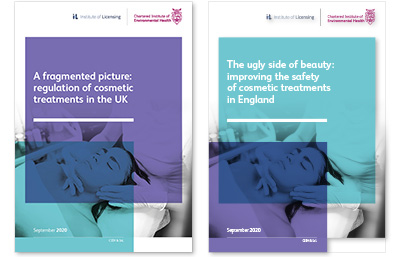Help us create an Environmental Health APPG
Join our campaign by urging your local MP to support the formation of an All-Party Parliamentary Group (APPG) on environmental health.
Cosmetic treatments are growing in popularity, with new non-surgical cosmetic procedures constantly emerging on the market. However, existing legislation and regulations are outdated and not fit for purpose. In most of England, local authorities lack the necessary powers to ensure treatments are carried out safely by qualified and competent practitioners. There are no mandatory requirements for education, training or qualification for the practitioners of most procedures, and the quality of training courses varies significantly in length, content, and standards.
We have been calling for an England-wide licensing scheme for non-surgical cosmetic procedures, which we believe is a crucial step towards ensuring that all those who carry out cosmetic treatments are qualified, competent, and operate in safe and hygienic premises.
Working alongside a coalition of 20 organisations, we drafted and supported a key amendment to the Health and Care Bill to improve safety in the cosmetics industry in England. Following extensive engagement with MPs and Lords across the political spectrum, the Government tabled an amendment, which was successfully passed by the House of Lords. As a result, the Secretary of State for Health and Social Care now has the power under the Health and Care Act 2022 to introduce a licensing regime for non-surgical cosmetic procedures in England (see our press release on the amendment).
In 2023, the UK Government held an important consultation on the proposed new licensing scheme (see our press release on the consultation). We submitted a response to the consultation and will continue working in partnership with key organisations to influence the shape and nature of the scheme.
 In 2020, we published two reports on the regulation of cosmetic treatments. Our first report, A fragmented picture: Regulation of cosmetic treatments in the UK, provided an overview of the prevalence, public awareness and existing regulation of these treatments across the UK. Our second report, The ugly side of beauty: improving the safety of cosmetic treatments in England, revealed the findings from our survey of regulators in England, who are responsible for keeping the public safe, exposing the serious gaps in protection. Notably, 90% of respondents agreed that an England-wide licensing scheme could improve the regulatory system.
In 2020, we published two reports on the regulation of cosmetic treatments. Our first report, A fragmented picture: Regulation of cosmetic treatments in the UK, provided an overview of the prevalence, public awareness and existing regulation of these treatments across the UK. Our second report, The ugly side of beauty: improving the safety of cosmetic treatments in England, revealed the findings from our survey of regulators in England, who are responsible for keeping the public safe, exposing the serious gaps in protection. Notably, 90% of respondents agreed that an England-wide licensing scheme could improve the regulatory system.
In 2024, new enforcement guidance for buttock augmentation and other body contouring procedures was launched by the Joint Council for Cosmetic Practitioners, with support from CIEH, the British Beauty Council and the Royal College of Surgeons.

Help us create an Environmental Health APPG
Join our campaign by urging your local MP to support the formation of an All-Party Parliamentary Group (APPG) on environmental health.